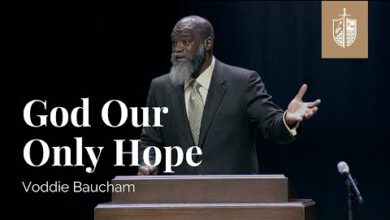The Limits Of Pleasure | Ecclesiastes 2: 1-11 |Voddie Baucham
The Limits Of Pleasure | Ecclesiastes 2: 1-11 |Voddie Baucham
Exploring the Limits of Pleasure: A Study on Ecclesiastes 2
Please take your seats and turn with me in your Bibles to Ecclesiastes chapter 2. Today, we will focus on the first 11 verses.
Last week, we examined the limits of wisdom and knowledge. This week, we will explore the limits of pleasure. As we study Ecclesiastes, it is crucial to remember key principles that guide our understanding. Ecclesiastes is a book of wisdom literature—it provides principles that help us comprehend how the world generally operates. However, these principles are not absolute laws.
Unlike the law of gravity, which always applies without exception, wisdom literature offers general truths about life rather than guarantees. When we mistake wisdom for law, we may assume that if we follow a certain principle, we are assured a specific outcome. But Ecclesiastes reminds us that life doesn’t always unfold as expected. There are exceptions that prove this truth, and yet, these exceptions do not undermine God’s sovereignty.
Another essential principle is that we must read Ecclesiastes with the end in mind. The book concludes with a powerful reminder: “Remember your Creator in the days of your youth” (Ecclesiastes 12:1) and “Fear God and keep His commandments” (Ecclesiastes 12:13). These verses assure us that while life may seem unpredictable, God remains in control. Even when things don’t go as expected, nothing catches Him by surprise.
The Limits of Pleasure
With this understanding, let us now turn our attention to the theme of pleasure.
Ecclesiastes 2:1-11 describes the pursuit of pleasure:
“I said in my heart, ‘Come now, I will test you with pleasure; enjoy yourself.’ But behold, this also was vanity. I said of laughter, ‘It is mad,’ and of pleasure, ‘What use is it?’ I searched with my heart how to cheer my body with wine—my heart still guiding me with wisdom—and how to lay hold of folly, till I might see what was good for the children of man to do under heaven during the few days of their life.
*I made great works. I built houses and planted vineyards for myself. I made myself gardens and parks and planted in them all kinds of fruit trees. I made myself pools from which to water the forest of growing trees. I bought male and female slaves and had those born in my house. I had great possessions of herds and flocks, more than any who had been before me in Jerusalem. I gathered silver and gold, the treasures of kings and provinces. I acquired singers, both men and women, and had many concubines—the delight of the sons of man.
So I became great and surpassed all who were before me in Jerusalem, and my wisdom remained with me. Whatever my eyes desired, I did not keep from them. I kept my heart from no pleasure, for my heart found joy in all my toil, and this was my reward for all my labor.
Then I considered all that my hands had done and the toil I had expended in doing it, and behold, all was vanity and a striving after wind, and there was nothing to be gained under the sun.”*
The Struggle with Earthly Pleasures
This passage is challenging because it deals with a topic that many of us struggle with—earthly pleasures.
When it comes to pleasure, people tend to fall into one of two extremes:
Hedonism – The belief that pleasure is the ultimate goal in life. Decisions are based on what brings the most pleasure, and the measure of good and bad is simply whether something makes us happy. This mindset is at the root of the Prosperity Gospel, which teaches that God’s will is for us to be wealthy, successful, and free from hardship. This “Christianized Hedonism” claims that if we believe and declare something, we will receive it.
Legalism – The opposite extreme, where all pleasure is viewed with suspicion or outright rejection, as though enjoying earthly things is inherently wrong.
Ecclesiastes challenges both extremes. Pleasure, in itself, is not evil—God created many things for our enjoyment. However, when pleasure becomes the primary pursuit of life, it ultimately proves to be empty, like “chasing the wind.”
The Takeaway
As we continue studying Ecclesiastes, let us remember that God is sovereign. While the world generally operates in certain ways, there are no guarantees outside of His divine will. True fulfillment is not found in wisdom, wealth, or pleasure but in fearing God and keeping His commandments.
Stay with us as we explore more of Ecclesiastes in the coming weeks. If this message has blessed you, don’t forget to like, subscribe, and turn on notifications to receive our daily reflections. May God bless you abundantly!
This version improves readability, ensures clarity, and enhances SEO effectiveness while maintaining the core message. Let me know if you’d like any adjustments!
